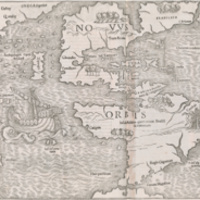IMAGINARIES OF CONNECTIVITY: FROM THE INVENTION OF AMERICA TO THE TRANSPACIFIC INDIES
In this talk, Prof. Ricardo Padrón challenges established narratives about the sixteenth-century invention of America as a continent separate from Asia, tracing the various ways in which the European geographical imagination attempted to keep the New World connected to Asia for reasons that were at times intellectual, and at other times political. He challenges to consider maps that are often neglected by historians who are eager to identify a quick paradigm shift in early modern world making, and to reconsider maps that we think we already understand. In so doing, he outlines ways of interpreting maps for their imaginaries of connectivity rather than of separation.
Ricardo Padrón is an Associate Professor of Spanish who studies the literature and culture of the early modern Hispanic world, particularly questions of empire, space, and cartography. Currently, he is completing a monograph about the transpacific imagination in sixteenth century Spanish imperialism. Provisionally entitled ReOrienting the Indies: Spain, the Pacific, and Asia, 1513-1609, the book will be published by the University of Chicago Press. His research for this book has taken him to China, Japan, and the Philippines, and has been sponsored by U.Va.’s Center for Global Inquiry and Innovation, Arts & Sciences at U.Va., and the National Endowment for the Humanities. He has also published on early modern poetry and historiography, and on the mapping of imaginary worlds in modern times.
Thursday, February 28 at 4:00pm to 5:30pm
ICC, 462 3700 O St. NW, Washington, D.C. 20057
